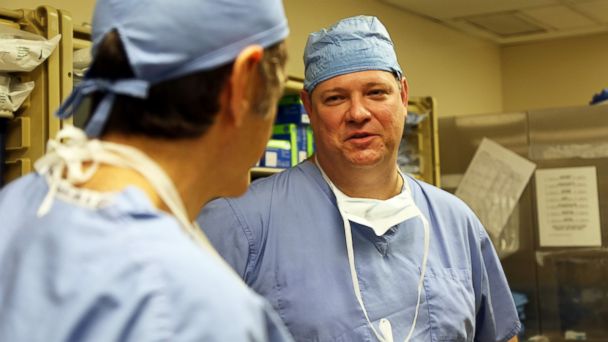Having Heart Surgery Is Like Flying, NY Med Doc Says

Dr. Michael Argenziano is chief of adult cardiac surgery at New York-Presbyterian Hospital/Columbia University Medical Center. (Image credit: NY Med)
By Michael Argenziano, M.D.
I'm a cardiac surgeon. I'm lots of other things, of course-a husband, father, and Little League coach-but I've spent the 30 years since high school graduation essentially working toward one goal, to become the best cardiac surgeon I can be.
Cardiac surgery appealed to me because it was a chance to make a real, measurable impact on the lives of people every single day, helping people out of literally life-threatening situations. As much as I enjoy this, it is the impact that these operations have on their extended families that is most gratifying. I am reminded of the importance of human life every day when I walk into the family waiting room after performing surgery, to find as many as dozens of people, usually from multiple generations, waiting on pins and needles to learn if their family member is going to be OK. Having endured illness and death in my own family, I can never forget that what for me is just one of hundreds of operations I perform each year, for that patient and family is one of the most significant and terrifying moments in their lives. I consider it the ultimate privilege to be trusted with that patient's life.
When Dr. Mehmet Oz and I met Mr. Carratala, the nervousness, uncertainty, and fear that this street-toughened police detective felt was palpable in the room. He, like most of us, was used to being healthy and in control of his life and surroundings. But he had suffered the unimaginable-a stroke-while on vacation, and in a whirlwind of doctor's visits and invasive tests learned that he harbored a life-threatening defect in his heart. An abnormal hole in the wall between two of the heart's chambers had allowed what would normally be a harmless speck of clot to cross over to the left side of his heart and be pumped to his brain.
We explained that although he would need open-heart surgery to close the hole and prevent another stroke, we'd be able to do this minimally invasively, through only a small incision between his ribs. This small consolation seemed to calm and reassure him, although I think what really made him and his family feel better is that we told them that the problem was fixable, and showed confidence that all would be well. Dr. Oz likes to say that the most important role of a physician is not as a healer, but as a teacher (the word "physician" means "teacher"), and I have to agree. I enjoy explaining complicated heart problems and how I'm going to fix them to patients as much as I enjoy actually doing the work. And I understand that one of my most important jobs is to take the burden of anxiety away from the patient by taking control of the situation.
I like to tell patients that having heart surgery is like flying on a commercial airliner. The risk of disaster is quite low, but that's not because flying an airplane is easy. It's because the pilot and his team are highly trained professionals, who repeatedly pull off the miracle of getting a 100-ton metal tube to fly in the sky without incident. That's what heart surgery is like - you're doing freakish things with a person, connecting them to complicated machines, stopping and opening the heart, making repairs, then starting it up again - and everyone expects it to go smoothly every time. And my kids ask me why I lost my hair…
People often ask me if I like my job, if the rewards are worth the tremendous effort and dedication. The answer usually depends on how my last patient has done, so that day the answer was yes.
Michael Argenziano, M.D., is Chief of Adult Cardiac Surgery at New York-Presbyterian Hospital/Columbia University Medical Center, where he is also Director of Minimally Invasive Cardiac Surgery and Program Director of the Residency in Thoracic Surgery. He received his M.D. from the Columbia University College of Physicians and Surgeons, and completed his training in cardiothoracic surgery, mechanical cardiac assistance, and surgical electrophysiology, all at NewYork-Presbyterian Hospital. He is married to Maria Rodino, a Columbia-trained endocrinologist, and they have six children, the oldest of whom will be attending Columbia in the fall and plans to be a heart surgeon himself. Argenziano now appears on ABC News, "NY Med."